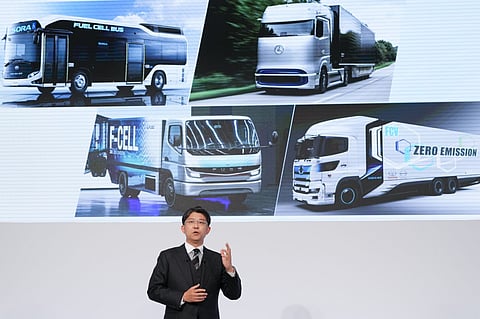Toyota, Daimler finalise plan to merge truck units in 2026
Hino Motors, Mitsubishi Fuso Truck & Bus to combine under anew holding firm by April 2026

Toyota Motor Corp. and Daimler Truck have agreed to finalise a merger of their truck manufacturing subsidiaries, Hino Motors Ltd. and Mitsubishi Fuso Truck & Bus, under a new holding company by April 2026 as they seek to boost margins and develop new technologies.
Toyota and Daimler will each own a quarter of the holding company, they said in a joint statement Tuesday, confirming their original agreement announced two years ago. Hino will also issue shares and transfer its Hamura plant to Toyota for ¥150 billion ($1 billion).
“This means Hino and Fuso will come together on equal footing,” Karl Deppen, the chief executive officer of Mitsubishi Fuso and of the new holding company, told reporters on Tuesday.
The combination comes as the commercial vehicle industry faces mounting pressure to adapt as electrification, autonomous driving and emissions compliance reshape global transport. By combining resources, Toyota and Daimler Truck aim to bolster profitability and accelerate innovation in a sector facing labor shortages, stricter environmental standards and rising development costs.
Not the goal
“Today’s final agreement is not the goal but the starting line,” Koji Sato, Toyota’s CEO, said. “Our four companies, aiming to achieve a sustainable mobility society, will continue to create the future of commercial vehicles together.”
The name of the fresh holding company, as well as the scope and nature of the combination, will be announced over the coming months.
When the deal was announced, Hino Motors was recovering from a scandal the previous year that involved years of misrepresented emissions data during engine tests, making it a major headache for Toyota, which owns just over 50% of the truck and bus maker.
The deal could also give Daimler Truck the ability to tackle its margin improvement targets more aggressively, given that Mitsubishi Fuso’s earnings have been a drag on profitability.
When talk of a merger first surfaced, some questioned why Toyota chose to combine Hino with Mitsubishi Fuso, instead of Isuzu Motor Co. Toyota is also a major shareholder of Isuzu, which maintains a strategic alliance with Volvo, which in turn holds a joint venture with Daimler Truck.
Toyota has said the merger won’t have an impact on its relationship with Isuzu, nor will it affect the company formed between Hino and Mitsubishi Fuso.
Sign up for the Daily Briefing
Get the latest news and updates straight to your inbox



